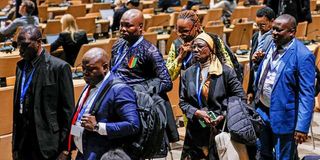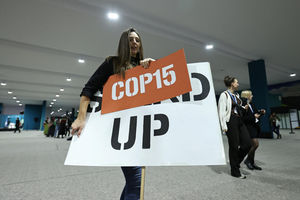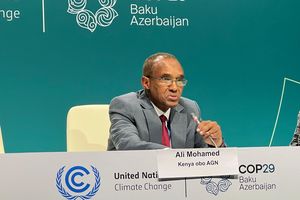Climate talks end in disarray as poor nations reject ‘meagre’ Sh39 trillion deal

Delegates leave a hall after listening to statements from various speakers at the United Nations climate change conference COP29, in Baku, Azerbaijan November 19, 2024.
What you need to know:
- Negotiators from Africa and other developing regions term the $300 billion per year deal as meagre and an unacceptable amount.
- The COP29 Presidency was compelled to extend the global climate meet by another day considering it was supposed to end on Friday.
In Baku, Azerbaijan
The world’s biggest climate meeting has failed to deliver a finance goal of $ 1.3 trillion (Sh169 trillion) per year needed to help poor countries that bear the brunt of pollution mitigate against disasters.
Negotiators from Africa and other developing regions staged a mass walk out from the COP29 negotiations in Baku, Azerbaijan, to protest at the $300 billion (Sh39 trillion) per year deal over the next 10 years offered by rich nations that are the greatest polluters.
They dismissed the $300 billion per year deal - a slight increment from an earlier offer of $250 billion - as a meagre and an unacceptable amount that cannot sort out the devastating effect of climate disasters.
The European Union (EU), Switzerland, New Zealand, Canada, Australia, Japan, the United States, Britain and Norway are the expected contributors to the fund which is meant to mitigate against climate crisis across the continent but which comes wrapped in ‘problematic conditions and loopholes’.
“The mere goal of $300 billion is grossly insufficient, failing developing countries on all fronts and the lack of a provision goal and shift of burden to developing countries is totally unacceptable. To make it worse, the outcome fails to address the growing adaptation finance gap and offers no guaranteed, dedicated funding for loss and damage,” Obed Koringo, a climate policy advisor at CARE International, told Nation.Africa.
“The failure of developed countries to deliver an ambitious climate finance goal at COP29 is a big blow to climate justice. At COP30 in Brazil next year, developed countries should redeem themselves by fully delivering on the $1.3trillion that developing countries have been asking for.”
Harjeet Singh, the Global Engagement Director for the Fossil Fuel Non-Proliferation Treaty Initiative, described the outcome of COP29 as diplomatic manipulation at its finest.
“At COP29, developed nations once again coerced developing countries into accepting a financial deal woefully inadequate to address the gravity of our global climate crisis. The deal fails to provide the critical support required for developing countries to transition swiftly from fossil fuels to clean, renewable energy systems, or to prepare for the devastating impacts of the climate crisis, leaving them severely under-resourced,” Singh said.
“The outcome offers false hope to those already bearing the brunt of climate disasters and abandons vulnerable communities and nations, leaving them to face these immense challenges alone. We must persist in our fight, demanding a significant increase in financing and holding developed countries to account for delivering real, impactful actions,” the expert told Nation.Africa.
On Saturday, due to lack of a quorum after the mass walk out by negotiators, the COP29 Presidency was compelled to extend the global climate meet by another day considering it was supposed to end on Friday.
According to the United Framework Convention for Climate Change (UNFCCC) ‘Rule 31’, the President shall not declare a meeting of the Conference of the Parties open or permit the debate to proceed unless at least one third of the Parties to the Convention are present.
This means that the presence of two thirds of the Parties to the Convention is a must for any decision to be taken.
“Dear colleagues, taking into consideration the status of negotiations, and in an effort to ensure that all Parties are represented at the conference, the secretariat is kindly requesting Parties to provide information regarding delegation who are present in Baku, and the conference venue, today, 23 November and tomorrow, 24 November. The secretariat would like to stress the urgency of this request and asks that you include this information in table below and return as soon as possible but before 18:00, today, 23 November 2024,” the COP29 secretarial told all heads of delegation on Saturday evening in an official text message.
The secretariat asked the delegations to change the air tickets of all their members who are needed for the process but had already booked to travel on Saturday and Sunday.
“Dear Group Chairs and Coordinators, the COP 29 Presidency, H.E. Yalchin will come to your respective Group during the current plenary regarding the new collective quantified goal (NCQG),” a second text read.
Earlier on Saturday, it all boiled down to what verbs to draft the final agreement, a situation described by critics of the deal as a diplomatic manipulation.
Negotiators haggled over verbs commonly used in draft and final texts by UNFCCC, especially on the legal difference between “calls on”, “invites” and “requests” as well as how “welcomes” compares with “notes.”
“Calls on all actors to work together to enable the scaling up of financing to developing country Parties for climate action from all public and private sources to at least USD 1.3 trillion per year by 2035,” the final version stated.
“In this context, reaffirms Article 9 and decides to set a goal in extension of the goal referred to in paragraph 53 of decision 1/CP.21, with developed country Parties taking the lead, to USD 250 billion per year by 2035 for developing country Parties for climate action,” the final updated version of the official text now read.
It highlighted the money is expected to come from a wide variety of sources, public and private, bilateral and multilateral, including alternative sources, according to the latest version of the revised draft text released on Saturday at 3pm.
"The latest climate finance text is a masterclass in diplomatic deception. Most disturbing is their attempt to shift responsibility through 'voluntary' South-South cooperation, essentially asking developing nations to pay for a crisis created by the wealthy,” Fred Njehu, a political strategist at Greenpeace Africa told the Nation.Africa.
Ambassador Ali Mohamed, Kenya’s Special Envoy for Climate Change and chair of the Africa Group of Negotiators (AGN), in his official statement agreed with the political strategist.
‘We are not prepared to accept things that cross our red lines," the headline of his official statement written in bold read.
“As African Group, we are prepared to reach agreement here in Baku, and indeed we must reach an ambitious agreement in all respects, but we are not prepared to accept things that cross our red lines,” Mr Ali said while stating that the Africa Group rejects provisions suggesting that African countries could contribute to the NCQG.
“The goal must remain a commitment by developed countries to mobilise resources for developing nations. This is consistent with the Paris Agreement and the precedent set by the $100 billion goal,” he said while calling for developed countries to show greater flexibility, and to respect a comprehensive reading of the Paris Agreement.
In reaction to the NCQG bridging proposal from the COP Presidency, the African Group said it was deeply disappointed and unable to work with certain elements.
In particular, the elements of the formulation of the goal that would render African countries contributors to the new goal, remain deeply problematic and unacceptable, the AGN chair cited.
“The proposed quantum of $300 billion falls far short of the estimated $5.1–6.8 trillion needed for climate action by 2030.
Adjusted for inflation, this figure is even lower than the $100 billion promised in 2009,” the AGN chair told developed countries, adding that such an insufficient target undermines the aspirations of developing countries and risks repeating the shortcomings of previous goals.
“The African Group emphasises the need for clarity in the draft text as follows, amendments to Paragraph 5 to prioritise the evolving needs of vulnerable nations, deletion of ambiguous language in Paragraph 7 that lacks actionable meaning, opposition to redefining the mandate of International Financial Institutions(IFIs) in Paragraph 23 and ensuring their focus remains aligned with mobilizing climate finance,” he said, adding that in Paragraph 8 of the draft text, the African Group calls for a clearer articulation of financial instruments, explicitly including grants, non-debt instruments, and concessional finance.
“It also opposes the inclusion of all outflows from Multilateral Development Banks (MDBs), recommending that only climate finance-related flows be considered.”
Evidently disappointed and heartbroken, the climate negotiators from least developed countries (LDCS) led by Kenya would minutes later after Mr Ali’s statement stage a mass walk from the main negotiation room at the COP29 venue over the second version of the proposed draft text.
First, the LDCs demanded to know exactly how much they should expect from the $250 billion that had been offered.
They also agreed with Mr Ali on the need for clarity on the sections of the draft text he highlighted.
"Parties are currently engaging on the new NCQG text, with a quantum of $300B per year by 2035... We are pushing for 500B," Michael Okumu, the Coordinator of Climate Change Negotiators at the Ministry of Environment, Climate Change and Forestry announced while giving an update.
The meeting would however be suspended indefinitely by the COP29 Presidency.
All hands on deck!
A senior and seasoned African climate negotiator did not waste time in summoning all Civil Society Organisations (CSOs) to join them in the negotiations area after the crucial meeting was suspended.
“We need CSOs!!!
We need the yellow badge foot soldiers!” She posted on a public WhatsApp platform in her call to action.
The meeting would be recalled 30 minutes later only for climate negotiators from LDCs and small island developing states (SIDS) to walk out together in protest.
As Per UNFCCC rules, Party badge holders are not allowed to make noise while protesting and the only form of ‘diplomatic noise’ they are allowed to make is to walk out whenever they are displeased, disgruntled or disappointed by the turn of events.
Speaking to Nation.Africa at the time, Pan African Climate Justice Alliance (PACJA) Executive Director Dr Mithika Mwenda urged AGN to completely walk away from the climate talks.
“Developed countries play really rough when it comes to climate diplomacy, during these negotiations they have their cards which they release during the last minute. Better a no deal than a bad deal because we live to fight another day,” he told the Nation.
However, at 2:25am on Sunday, Parties would finally agree to adopt what was the final draft of the contentious text with the COP29 Presidency gaveling the decision without wasting any time.
Two crucial paragraphs that LDCs and SIDs valiantly fought for had now been officially now added to the draft text after intense ‘give and take’ negotiations.
“Paragraph 16 Decides that a significant increase of public resources should be provided through the operating entities of the Financial Mechanism, the Adaptation Fund, the Least Developed Countries Fund and the Special Climate Change Fund and also decides to pursue efforts to at least triple annual outflows from those Funds from 2022 levels by 2030 at the latest with a view to significantly scaling up the share of finance delivered through them in delivering on the goal contained in paragraph 8 above;”
Paragraph 27 Decides to launch, under the guidance of the Presidencies of the sixth and seventh sessions of the Conference of the Parties serving as the meeting of the Parties to the Paris Agreement, in consultation with Parties, the “Baku to Belém Roadmap to 1.3T”, aiming at scaling up climate finance to developing country Parties to support low greenhouse gas emissions and climate-resilient development pathways and implement nationally determined contributions and national adaptation plans, including through grants, concessional and non-debt-creating instruments, and measures to create fiscal space, taking into account relevant multilateral initiatives as appropriate; and requests the Presidencies to produce a report summarizing the work as they conclude the work by the seventh session of the Conference of the Parties serving as the meeting of the Parties to the Paris Agreement (November 2025),” the final adopted text now states in part.
According to Mr Koringo, Paragraph 7 calls on "all actors" to work together to enable scaling up to at least $1.3trillion which shifts focus from developed country obligations to include all actors including developing countries.
This means that developing countries have been boxed into a ten-year period despite the inadequate quantum - timeline of 2035 is too late and the commitment may only be met in the last year.
The expert observes that in Paragraph 8 of the adopted text, there's no separation of provision or mobilization goals and there's no indication that developed countries will provide all the finance in line with their obligation under Paris Agreement article 9.1.
“Paragraph 27 presents a ray of hope for pushing further the achievement of $1.3 trillion: Baku to Belem roadmap - although it lacks substance and is a vague process with no clear structure or accountability.
There’s also no strong emphasis on qualitative elements in the $300 billion such as additionally, grant, based, concessional finance especially for adaptation and loss and damage, ”he told Nation.





